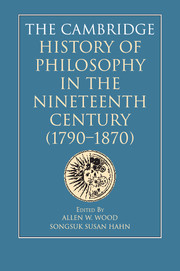Book contents
- Frontmatter
- Contents
- Contributors
- Preface
- Abbreviations
- Introduction
- I Philosophy in the Nineteenth Century
- II Logic and Mathematics
- III Nature
- IV Mind, Language, and Culture
- V Ethics
- VI Religion
- VII Society
- 19 Philosophical Responses to the French Revolution
- 20 The Decline of Natural Right
- 21 Conceptions of Society in Nineteenth-Century Social Thought
- 22 Nineteenth-Century Political Economy
- 23 The Nation-State
- 24 Nineteenth-Century Ideals
- 25 Social Dissatisfaction and Social Change
- VIII History
- References
- Index
- References
24 - Nineteenth-Century Ideals
Self-Culture and the Religion of Humanity
from VII - Society
Published online by Cambridge University Press: 05 December 2012
- Frontmatter
- Contents
- Contributors
- Preface
- Abbreviations
- Introduction
- I Philosophy in the Nineteenth Century
- II Logic and Mathematics
- III Nature
- IV Mind, Language, and Culture
- V Ethics
- VI Religion
- VII Society
- 19 Philosophical Responses to the French Revolution
- 20 The Decline of Natural Right
- 21 Conceptions of Society in Nineteenth-Century Social Thought
- 22 Nineteenth-Century Political Economy
- 23 The Nation-State
- 24 Nineteenth-Century Ideals
- 25 Social Dissatisfaction and Social Change
- VIII History
- References
- Index
- References
Summary
It was a nineteenth-century commonplace – though perpetually proclaimed as a disturbing discovery – that the new commercial, industrial, and democratic civilization was producing a debased form of human being and human life. Here, for instance, is Matthew Arnold on the Puritan middle class: “It presents a defective type of religion, a narrow range of intellect and knowledge, a stunted sense of beauty, a low standard of manners”; and Friedrich Engels on the condition of the working class in Manchester: “If any one wishes to see … how little of civilization [a human being] may share and yet live, it is only necessary to travel hither”; and John Stuart Mill on his contemporaries: “their human capacities are withered and starved”; finally, Thoreau: “We live meanly, like ants.”
The complaints were multiple: that agents are pressed into a single mold (Emerson: “Society everywhere is in conspiracy against the manhood of every one of its members…. The virtue in most request is conformity”); about the despotism of public opinion (Mill: “In our times, from the highest class of society down to the lowest, everyone lives as under the eye of a hostile and dreaded censorship”); about the obsessive pursuit of money (Carlyle: “Cash Payment has become the sole nexus of man to man”); and about the absence of social solidarity (de Tocqueville: “I see an innumerable multitude of men, alike and equal, constantly circling around in pursuit of the petty and banal pleasures with which they glut their souls. Each one of them, withdrawn into himself, is almost unaware of the fate of the rest”).
- Type
- Chapter
- Information
- Publisher: Cambridge University PressPrint publication year: 2012

